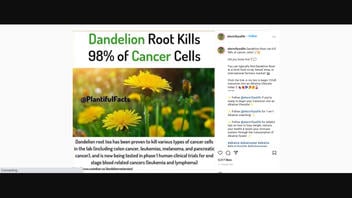
Does dandelion root kill 98% of cancer cells? No, that's not true: Some lab studies done in vitro (petri dish or test tube work not using living bodies) have shown a potential for dandelion root to kill cancer cells. However, those studies are not human clinical trials that prove that dandelion root is effective in the body.
The claim appeared in an Instagram post (archived here) where it was published on December 6, 2021, by an account promoting an alkaline lifestyle. The caption of the post began:
Dandelion Root can kill 98% of cancer cells!📝💥
𝘋𝘪𝘥 𝘺𝘰𝘶 𝘬𝘯𝘰𝘸 𝘵𝘩𝘢𝘵❓💭
You can typically find Dandelion Root at a local food co-op, herbal shop, or international farmers market! 🏬
This is how the post looked on Instagram on December 7, 2021:
(Source: Instagram screenshot taken on Tue Dec 7 15:23 2021 UTC)
Dandelion root was mistakenly touted as a miracle cure starting in 2012 when Canadian oncologist Caroline Hamm publicly discussed promising lab results showing that dandelion tea killed cancer cells. However, Hamm later clarified that there is no compelling evidence that dandelion tea is a cancer cure, and she warned patients not to treat it as such.
Dandelion has been the focus of several studies examining its effect on cancer cells. The Dandelion Root Project, which was launched by the University of Windsor in Canada in 2009, has conducted in vitro and animal model studies that point to dandelion root's potential as a cancer-fighting herb. The project is noted in the Instagram post making the claim, which correctly states that the project launched a phase one human clinical trial looking at dandelion root extract's effects on blood cancers. However, that trial was still at phase one and is closed at the time of writing.
Many of the other studies on dandelion root have been done in vitro. Examples include a 2017 study that examined the suppression of gastric cancer cell proliferation by dandelion root extract and a 2012 study that discussed extrinsic cell death by dandelion root extract in human chronic myelomonocytic leukemia cells. No extensive human trials have confirmed such effects by dandelion root on cancer cells.
The National Center for Complementary and Integrative Health (NCCIH), one of the agencies that make up the National Institutes of Health, states that although dandelion is commonly used as a tonic and a food substitute, there is "little scientific evidence" about its health effects and there is "no compelling scientific evidence supporting the use of dandelion for any health condition." However, the herb is typically considered safe in small portions.
Lead Stories previously published a similar fact check refuting the claim that dandelion is 100 times stronger than chemotherapy and eliminates cancer in two days.

















